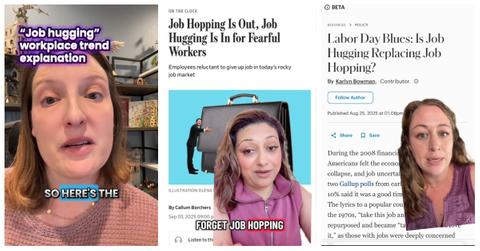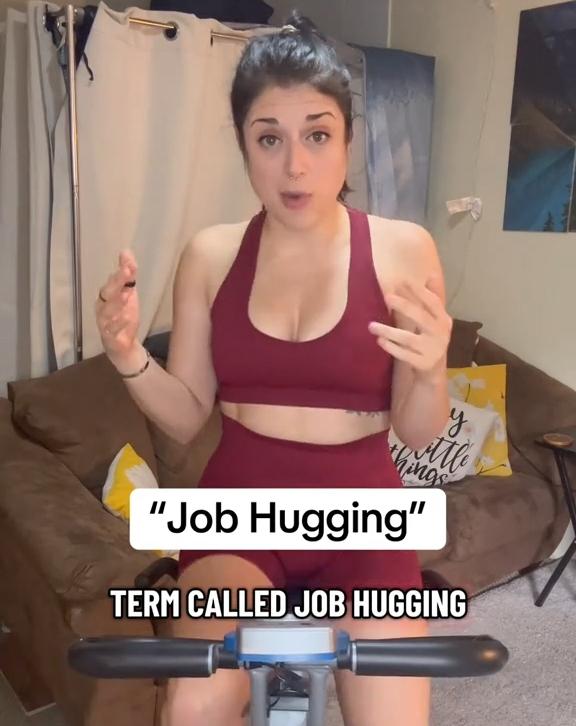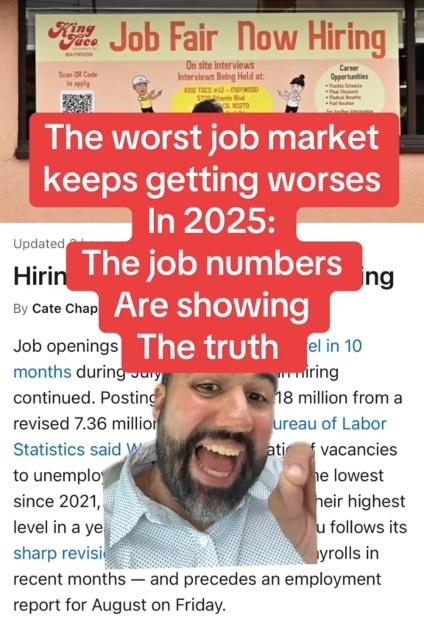"Job Hugging" Isn't the Warm and Fuzzy Phrase it Sounds Like — Here's the Sad Meaning
If "job hopping" is a joyful phrase, "job hugging" can be seen as the opposite.
Published Sept. 5 2025, 2:56 p.m. ET
In today's employment landscape, having a job is a relief in and of itself. There was a time when people were able to pick and choose between ideal positions and negotiate for better terms. But those days are long gone, for most people.
Exit: "job hopping." Enter: "job hugging." It sounds warm and fuzzy, but it's not.
"Job hugging" is a natural reaction to the uncertainty of today's volatile job market. But what exactly is it? Here's what we know about the phrase and why people are turning to it to stave off anxiety and uncertainty.
What is the meaning of "job hugging"?
If you can recall that "job hopping" means "the practice of moving from job to job" (per Merriam-Webster), it's basically the practice of skipping between jobs when opportunities are plentiful and a worker doesn't want to settle with one company for any number of reasons.
"Job hugging" can be viewed as the opposite.
Forbes writes, "Job hugging means staying in a role even when it no longer feels like a great fit."
This means that employees feel compelled to stay in a job that doesn't feel right or even one that may be toxic or very stressful, due to a number of motives, including financial fears, job uncertainty, or worries about being employable.
The outlet taps the phrase, "better the devil you know" to explain why people are choosing to stay in roles that don't fit them. And sometimes, they explain, it makes sense. For instance, if you're in a career where jobs are unstable, holding onto employment can be a wise strategy.
But if you're stuck in one role due to fears that may not be entirely grounded in the realities of the job market, you may be stagnating and missing opportunities.
The dismal outlook of the job market is causing people to fear taking a chance.
Of course, it seems more people are feeling compelled to "job hug" than ever these days, and there's a numbers game forcing them into the role.
In September, the market numbers released for August sent a ripple of fear through the employed and unemployed alike.
The Labor Department reported that, for the first time since 2021, more jobs were lost than gained. Reuters reports that economists are blaming the sweeping tariffs enacted by President Donald Trump, along with a volatile crackdown on immigration.
Healthcare remained the strongest industry through August, posting the highest gain in jobs, but that follows what Reuters reports is a two-month decline, meaning even "sure thing" careers are on unsteady footing these days.
Against such an uncertain backdrop, it's easy to understand why people would cling to a job ... any job. While no one wants to stagnate in their career or stay where they are being treated poorly or being paid unfairly, it seems that the motto "any job is better than no job" is fueling many people's career decisions in 2025.
With no hope of tariffs easing on the horizon, the future looks dismal too.


